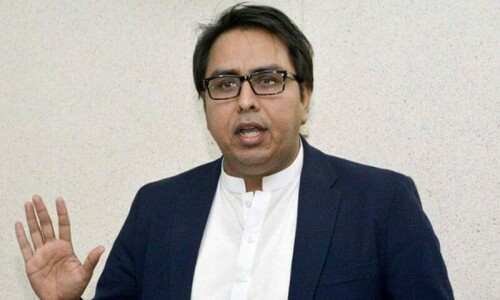LAHORE: The future of book reading and consequently of publishers still lies in the good old public libraries, especially those in small towns away from big urban centres. And the role of state can’t be ignored in this regard that controls these establishments but without showing any real concern for the readers.
This transpired in Dawn’s discourse with some publishers known for their quality and commitment to promote enlightenment through printing good books.
“Sometimes publishers are accused of promoting ‘anti-state’ views. But they mostly are not anti-state, they in fact want the state to be better in certain areas of its influence where no one else can bring improvement,” says Zahoor Ahmad Khan, who runs Fiction House, and its subsidiary Tareekh Publications.
He blames the state’s lack of interest and lack of patronisation for the decline in book reading in the country. “I don’t blame internet for it. The internet has only distracted the reader a bit. Printed word still has the power to hold the reader,” he says.
He laments lack of book reading, especially in urban centres of upper Punjab where, he says, “People spend a lot more on food than on books.”
“I have seen more respect for books, writers and the publishers in so-called underdeveloped areas of Punjab as compared to big urban centres,” he says, adding that “it is perhaps because people with a full belly have a scant regard for anything else”.
He says in south Punjab, Multan has emerged as a literary hub and book festivals are being held with focus on serious reading.
“If we take a look at serious book reading trend all over the country, you will be surprised to know it is stronger in smaller provinces like Sindh and Balochistan as compared to Punjab where people have better incomes,” he says.
“Popular fiction like Humera Ahmad’s novels sell more in Punjab than any book of historian Dr Mubarak Ali,” he says, adding that newspapers too can play an important role in promoting serious reading by publishing reviews and covering book launches.
He says that after introduction of computer composing, the publishing industry thrived and it was saved by China paper that is low-cost despite having good quality.
Amjad Saleem, who runs Sanjh Publications, is also of the view that the state with its huge infrastructure in the form of public libraries at tehsil and district headquarters level can promote serious book reading even in far-flung areas.
He mentioned lack of concern on part of the government and malpractices in using official grants meant for book purchases at school and college level as two main factors responsible for present decline in book reading in the country.
He also holds big publishing houses with resources partly responsible for the situation, suggesting they also organise book festivals at small places away from urban centres like Dera Ismail Khan, Zhob etc, shunning their profit-oriented psyche. He says his publishing house has planned a literature, art and craft festival at Texila this September.
“A publisher should have a vision. We should discourage hate material and promote tolerance in society by highlighting cultural and lingual diversity.”
He stresses the need for encouraging books in regional languages like Seraiki, which have great potential.
About high prices of books, he says it is an issue and the rates should be brought down.
Refusing partly to buy the notion that people spend lavishly on food and cry about book prices, he says: “My point is that we should also consider those readers who don’t have enough money to spend on food but they still want to read good books.”
Rana Abdul Rehman of Book Home says that reading habit should be encouraged from childhood and books included in the list of items usually gifted to children on their birthdays and passing exams.
He terms both plagiarism and piracy banes of his profession as they discourage those who want to buy books to learn. In this regard, he gives example of some 30 books published immediately after the assassination of Benazir Bhutto and they were almost the same, offering nothing new to a reader who wanted to know details.
“Those who bought any of these books will think twice before buying one next time,” he says.
He too stresses the need for judicious use of government grants for public libraries and educational institutions.
Published in Dawn, June 9th, 2014














































Dear visitor, the comments section is undergoing an overhaul and will return soon.